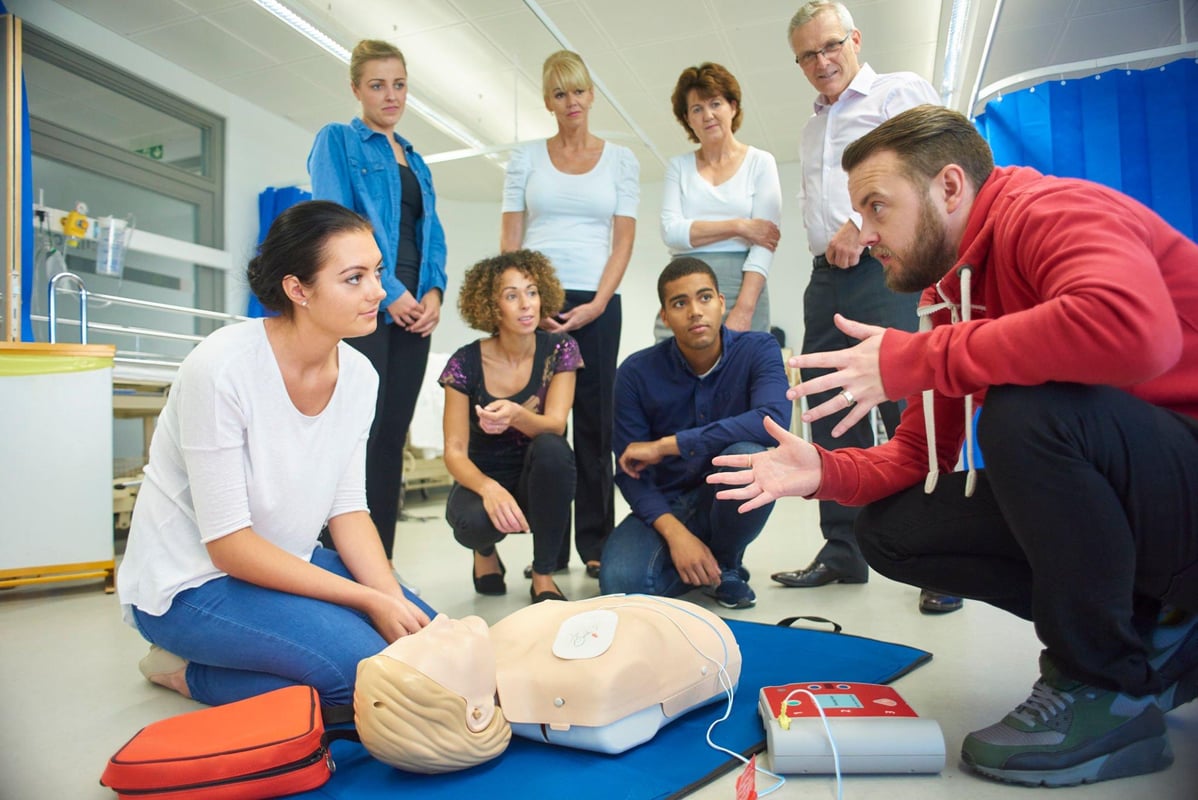$75 total
No cost info
$45 total
No cost info
No cost info
No cost info
No cost info
No cost info
$36.50 total
No cost info
First Aid training is critical, irrespective of your profession. It's a skill that can save lives in emergencies, whether at home, in the office, or in public spaces. In a bustling city like New York, where anything can happen, being equipped with First Aid skills is beneficial. But where does one begin? Here, we'll guide you through the process of finding First Aid classes near you in New York.

First Aid is the immediate care provided to a person suffering from an injury or illness until professional medical treatment can be obtained. It involves a range of procedures from simple tasks like bandaging a wound to more complex procedures like mouth-to-mouth resuscitation. First Aid does not just entail the practical aspect; it includes the ability to assess a situation and make appropriate decisions about the necessary steps to take.
First Aid training typically entails both theoretical learning and hands-on experience. The requirements for any First Aid class often include:
Basic education: Most First Aid courses do not require advanced education, but basic literacy and numeracy are usually necessary.
Physical fitness: First Aid training involves physical exertion, so a basic level of fitness might be required.
Age requirement: The minimum age for First Aid training varies, but it's typically around 16 years old.
Ensure that you meet all the prerequisites before signing up for a First Aid class.
When searching for the right First Aid class, consider the following:
Accreditation: The class should be certified by a recognized body, such as the American Heart Association or Red Cross.
Course content: Ensure the course covers essential topics, including CPR, wound care, and emergency response.
Practical training: The best classes offer hands-on training, where you can practice the skills you're learning.
First Aid classes typically combine classroom learning with practical sessions. You can expect to learn about:
Basic life support: This includes CPR and use of automated external defibrillators (AEDs).
Handling emergencies: You'll learn how to assess and manage various medical emergencies.
Wound care: This covers how to treat different types of injuries, from minor cuts to fractures.
Upon completion of the class, you'll likely need to pass a written exam and a practical skills test to become certified. The certification is usually valid for a certain period, after which you'll need to take a refresher course to maintain your certification.
Once certified, you can consider jobs where First Aid training is beneficial or even required. Opportunities can range from healthcare roles, such as a Certified Medication Aide or an Emergency Medical Technician, to roles in education or childcare.
After becoming a First Aid provider, you might want to expand your skills further. Consider taking additional classes such as Advanced First Aid, Child and Babysitting Safety, or Wilderness and Remote First Aid. Each of these courses can build on your existing knowledge, making you more prepared in a wider variety of emergency situations.
Pursuing advanced training can make you more proficient and confident in providing First Aid. Courses like Advanced Cardiac Life Support (ACLS) or Pediatric Advanced Life Support (PALS) can be considered.
One of the best ways to apply your First Aid skills is through volunteering. Organizations such as the Red Cross often need volunteers for their programs.
First Aid certification can be a stepping stone to a career in healthcare. You could become a Pharmacy Technician or a Medical Assistant, roles that often require First Aid skills.
Taking First Aid classes designed for specific groups (like children, athletes, or the elderly) can enhance your skillset and broaden your opportunities.
First Aid classes are an invaluable investment in your personal and professional life. Not only do they equip you with potentially life-saving skills, but they can also open up a range of career opportunities. Whether you're looking for First Aid classes near you in New York or interested in related jobs, remember, knowledge in First Aid is an asset that will always serve you well.
For those looking to get started in this field, Dreambound's array of city-specific guides can be a valuable resource. And if you're in a different area or mulling over a move, don't miss out on our other helpful guides.
Thinking about all of the factors involved in making a career shift? Take a look at some of the guides we've written to help you in your journey.
Dreambound's platform allows prospective students to find the right educational program for them through searching, filtering, and connecting with our extensive selection of career & technical education partners.
Dreambound has over 70 programs across healthcare, technology, business, and industrial trades. This includes programs such as Medical Billing, Cybersecurity, and welding.
Some of our schools offer financial aid for those who qualify. Many others offer payment plans, where you can pay the cost of class over time.
Yes, Dreambound offers many online programs. On Dreambound's search, you can filter by online, in-person, and hybrid (part online, part in-person).
Dreambound is completely free for you to use! We are supported by schools and organizations who pay to advertise on our website, so we can offer all of our career resources for free.